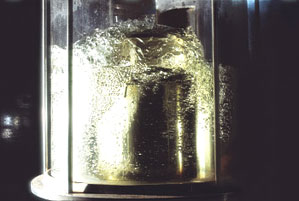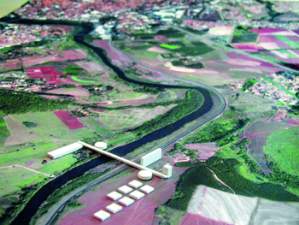 ÚNICAPiracicaba, a city of 315,000 inhabitants, set in a traditional sugarcane region in inner-state São Paulo, wants to become a benchmark in the promising world market for ethanol. That is why it is setting out R&D with initatives from both the government and the producing sector . “It is the only city in Brazil that has the entire ethanol production chain in one place”, states Luciano Tavares de Almeida, city secretary for Industry and Trade. The city has ten alcohol and sugar mills, although it is the Ribeirão Preto region that enjoys the position of largest sugarcane producer in the state. Piracicaba also has some 80 metallurgical plants, but vies with the town of Sertãozinho for the number one position among the largest suppliers of capital goods and services for the sugar and alcohol industry.
ÚNICAPiracicaba, a city of 315,000 inhabitants, set in a traditional sugarcane region in inner-state São Paulo, wants to become a benchmark in the promising world market for ethanol. That is why it is setting out R&D with initatives from both the government and the producing sector . “It is the only city in Brazil that has the entire ethanol production chain in one place”, states Luciano Tavares de Almeida, city secretary for Industry and Trade. The city has ten alcohol and sugar mills, although it is the Ribeirão Preto region that enjoys the position of largest sugarcane producer in the state. Piracicaba also has some 80 metallurgical plants, but vies with the town of Sertãozinho for the number one position among the largest suppliers of capital goods and services for the sugar and alcohol industry.
However, the truth is that Piracicaba offers strategic advantages: it is the site of the University of São Paulo’s centenary Luiz de Queiroz Agricultural School (Esalq), which has been responsible for pioneering research into the use of soil for sugarcane and the disposal of vinasse; for the last 38 years, it has also housed the Center for Sugarcane Technology (CTC – Centro de Tecnologia Canavieira), formerly known as the Copersucar Technology Center, where most of the varieties of sugarcane farmed in Brazil’s center-south region were developed. More recently, it became the address of the National Biofuel Complex, opened in 2004 with the aim of coordinating efforts and defining strategies for using different sources of biomass, and aiding the development of a biofuel promotion and production policy in the country.
All it needed was to articulate its research activities with the industry, the unions, the city council and organizations such as Sebrae, the Brazilian Support Service for Small Companies, in a politically coordinated action capable of yielding a shared project and of guaranteeing the interface of these players with the development agencies and the government. The organization model chosen was the Local Productive Arrangement (LPA), internationally known as a cluster. This is an agglomeration of companies in the same geographical area with production specialization and articulation, interaction, cooperation and learning bonds. The LPAs function around certain “key variables”, explains Antonio Carlos de Aguiar Ribeiro, Sebrae-SP regional manager for Piracicaba. “They foster the integration of the agendas and projects, train leaders, encourage the development of strategic planning and the shared use of infrastructure, besides encouraging the creation of shared research, development, engineering and logistical structures.” They work under the guidance of a coordinator, who is in charge of project development, and they are organized around a Higher Council, formed by representatives of the federal, state and city governments, and by organizations from the sugar and alcohol industries. The businessmen are members of the Strategic Council, whereas the research institutions form the Technical Council. These entities coordinate work groups that focus on specific subjects.
The idea of organizing the local players in an Alcohol LPA, which was given the abbreviation Apla as a name, arose in 2005, when the federal government asked producers, mill owners and researchers to receive delegations from other countries that were interested in biofuel, recalls Almeida. Piracicaba performed the task by organizing a sort of “ethanol tour”: the program started with a visit to Esalq or to the CTC, then it moved on to an equipment manufacturing metallurgical company , and finally it closed with a visit to an ethanol plant. Last year alone six thousand visitors from 58 countries followed this program. “At the end of it, the visitor will have become acquainted with the entire biofuel production chain”, Almeida assures us.
Ethanol certification
One of the first initiatives of the Piracicaba Apla, which only got its tax registration number (CNPJ) last August 31, notes the Industry and Trade secretary, was to conduct, with the aid of the local Sebrae, a diagnosis of the companies that are part of the production chain, identifying bottlenecks in the agricultural, industrial, commercial and logistical areas, before defining a strategic action plan.
It was found, for example, that the standardization of ethanol is urgently needed in order to safeguard Brazilian exports from potential technical barriers that biofuel importing countries might impose. To this end, Apla signed an agreement with Inmetro, the National Institute of Metrology, Standardization and Industrial Quality, for the production of certified reference materials (CRM) for the domestic market. “The agreement resulted from the interests of both sides: the producers, which needed CRMs for the quality of the tests, and Inmetro, which has been involved with ethanol CRMs since 2003”, states Romeu Daroda, advisor to Inmetro’s Scientific and Industrial Metrology Office.

PIRATININGA ARQUITETOSModel of the Bionergy Technological Complex: 13 buildings and one bridge-structurePIRATININGA ARQUITETOS
The main physical and chemical parameters have already been “consented” (to use the metrology jargon) and can be used in the domestic market, Daroda tells us. The institute is now negotiating a consensus with the US National Institute of Standards and Technology (Nist), which is to become the standard for the marketing of Brazilian ethanol in the USA. “Inmetro is also involved in Biorema, under the coordination of the Netherlands Meetinistituut (NMI), from Holland, to “consent” CRMs in Brazil, the USA, and the European Union” states Daroda.
Another ethanol production chain bottleneck that the Apla diagnosis identified was a need for professional training of the people involved with the entire production chain. Apla negotiated with the state government the establishment of a Technology College (Fatec – Faculdade de Tecnologia) offering courses on biomass and the alcohol industry, while it also signed an agreement with the Ministry of Labor for training sugarcane cutters.
In order to strengthen competencies in the business research and business administration fields, the National Biofuel Complex, in conjunction with Esalq, the Getúlio Vargas Foundation and Embrapa created the first intra-institutional master’s degree in agroenergy, which has already been approved by Capes (the Coordination for Training of People with Higher Education) and that will start operating next year.
The Center for Sugarcane Technology also plays a strategic role. “We have helped to identify technological gaps”, explains Tadeu Andrade, its R&D director. The organization has become a sort of “technical branch” of Apla: besides R&D conducted with the funds provided by 160 alcohol and sugar mills, the Center articulates partnering agreements with international research institutes (see box) and looks for resources for new project developments. Recently, it invited Finep (Financer of Studies and Projects) to visit Piracicaba to present its financing portfolio to local companies. “We obtained funding for three projects to develop technologies for semi-finished goods”, he tells us.
Prospecting markets
While it strengthens the local production chain, Apla is also prospecting the overseas market. It signed an agreement with Apex, the Brazilian Agency for the Promotion of Exports and Investments, for R$ 4.5 million in 2007 and 2008. The funds will be used to send international missions to countries that have the potential to import the ethanol, capital goods, engineering services and technologies created by the region’s research institutes and companies. “The agreement took on a nationwide character and started to include companies from the sugar and alcohol sector in other regions in the country”, says the Piracicaba Industry and Trade secretary. In August, 41 representatives from 27 Brazilian companies, 18 of which have their head offices in Piracicaba, attended the conference of the International Society of Sugar Cane Technologists (ISSCT), in South Africa. “Sales amounting to US$ 93 thousand were generated and the prospects for future business total US$ 164.3 million over the next 12 months”, the secretary comments.
Apla’s “great undertaking”, according to the evaluation of the Industry and Trade secretary, will be completed on November 15. This is the Bioenergy Technological Complex, a R$ 500 million project that will be set up three kilometers away from the city, in an area of 300 sq. m granted by Aguassanta, the holding company of the Cosan Group, one of the world’s largest sugar and alcohol producers. The city council and Esalq are partners in the undertaking. “We are completing the identification of competencies and requirements in order to outline the business plan, and define governance and management, among other actions”, states Weber Amaral, the coordinator of the National Biofuel Complex, who is also responsible for the project. The Piracicaba Technological Complex, according to him, already has the backing of the São Paulo State Development Bureau. It will be the fifth project to be implemented by the São Paulo System of Technological Complexes, such as those in the cities of São Paulo, São Carlos, Campinas and São José dos Campos.
The architectural project, designed by Paulo Mendes da Rocha, is daring: there will be a total of 13 buildings, including the ESALQ events center, a corporate center and a hotel, among others, to be built on both banks of the Piracicaba River and to be linked by a bridge structure in which the research laboratories will be set up. Around the undertaking 2,500 homes will be built for its researchers, besides an ecological park. “There are entrepreneurs who have manifested an interest in this and we expect to start building it in 2008”, guarantees João Bosco Alves Silveira, the Aguassanta property director.
There are still problems to be solved. A study conducted by Oswaldo Elias Farah, from the Piracicaba Methodist University between March 2006 and March 2007 with the support of FAPESP’s Public Policies Program, found that small and medium-sized companies depend heavily for their technology on the large metallurgical companies. “Even though their growth picked up in the last three years, these companies have a low level of innovation and many of them have managerial shortcomings”, explains Farah. Though most of the companies work round the clock, they lack a strategic view of their business. Some are not yet affiliated with Apla, due to unawareness or lack of interest, he comments. “The small and medium-sized companies are short not only of knowledge applicable to the technological improvement of their products, but also of management strategies and tools that can help them expand their market share. Innovative management is perhaps their only path to growth and, especially, to survival”, he concludes.
The Sugarcane Technology Center and the Danish company Novozymes, which has a 45% share in the global industrial enzymes market, signed a cooperation agreement with the objective of doing research into cellulose ethanol, obtained from enzymatic hydrolysis, which would make it possible to produce fuel alcohol from sugarcane bagasse.
According to the agreement, the Sugarcane Technology Center should supply the Brazilian ethanol production sector with enzymes produced jointly with Novozymes, whereas the Danish company, in exchange, will gain access to research into the new ethanol production technologies developed by the Center. According to the office of the director of the Sugarcane Technology Center, this partnership will provide “extraordinary prospects for ethanol production.”
Republish